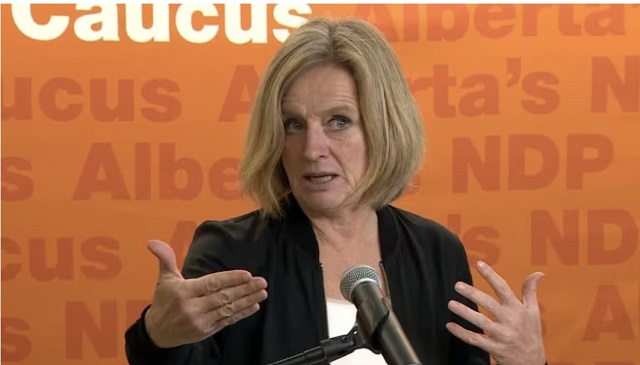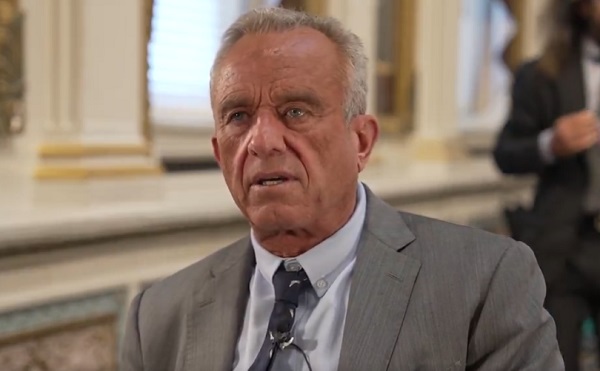Alberta
Former Premier Rachel Notley steps down as leader of the Alberta NDP

News release from the Alberta NDP
Good morning everyone.
We’re gathered on the traditional territory of Treaty 6 and I also want to acknowledge the Metis people who share a deep connection to this land.
There’s been a great deal of speculation since the election as to my future. While politics to the south of us would suggest I have at least 20 years left in my political career, I think the advisability of that is debatable.
More to the point, having considered what I believe to be the best interests of our party, our caucus, as well as my own preferences, I am here today to announce that I will not be leading Alberta’s NDP into the next election.
I have informed both the senior officers of Alberta’s NDP as well as my caucus and staff that upon the selection of a new leader, I will be stepping down from that role.
This October will be 10 years since I was first given the honour of leading our party.
At the time we were the fourth party in the legislature with a massive caucus consisting of four MLAs. Less than seven months later we had a caucus of 54 MLAs, and Alberta’s first NDP government.
While many of those folks never expected to be elected…
…let alone find themselves in a government cabinet, we scrambled, quickly, to live up to the immense privilege the people of Alberta bestowed upon us.
We didn’t get everything right. But we governed with integrity, an ambitious agenda and an earnest desire to make life better for Albertans.
While this is not the place to go down into a policy rabbit hole, I will highlight just a few of the things that make me proud.
We approved and built the Calgary Cancer Centre – a decision that was at least a decade overdue.
We stood up for the rights of working people – improving their access to unions, increasing their holidays, protecting their safety in the workplace …
…And we were the first jurisdiction in North America to raise the minimum wage to $15 per hour, making a real difference in the life of Alberta’s working poor and tens of thousands of young people and their families.
We secured Alberta’s first pipeline to tidewater in over 50 years, ensuring that the return to Albertans for the sale of resources we all own is permanently increased.
We eliminated coal-fired electricity in Alberta, thereby increasing the health of countless citizens, and at the same time kickstarting our renewable energy industry to be the fastest growing on the continent…
…all while significantly reducing our emissions in one fell swoop.
And, finally, in the midst of a recession caused by the international collapse in the price of oil (seriously folks, I did not cause that), we cut child poverty in half.
But, as I said, we didn’t get it all right. And Albertans told us so in April of 2019.
Now I thought about leaving then. And there are many reasons I did not. But the biggest is probably this: too many people were declaring that the Alberta NDP was done, and, more importantly, that Alberta was destined to revert back to being a one party conservative state.
And I knew that wasn’t true. And I also knew that it would be awful for Albertans if they came to believe that it was.
So four years later, last spring, we came so close to earning the right to lead Alberta again.
We received the highest percentage of the vote that the Alberta NDP ever has.
We won Edmonton,
We won the majority of seats in Calgary,
We increased our vote throughout the province and we elected the largest Official Opposition in the history of this province.
An opposition that is very very ready to take over the reins of government.
But it wasn’t enough. And that’s why it’s now time for me to leave.
But if there is any ONE accomplishment that I can leave behind me… it’s that we are NOT a one party province where Albertans have no real choice about how their province is run.
Albertans do not ever have to feel that elections and their opinions don’t matter.
It was that way when I started. It’s not that way anymore.
Not only do I leave Albertans with that electoral choice, I leave them with a caucus that is filled with expert, dedicated, diverse people, supported by the hardest working and most skilled political staff in the country.
Our NDP team will not stop fighting to make life better for all Albertans.
We will fight to protect and improve our healthcare, to stand up for our children’s right to a world-class education, to fix the housing crisis, to keep Albertan’s CPP safe, and to confront the reality of climate change.
Roughly ten years ago today, I talked to my kids about how they’d feel if I decided to run for the leadership of the Alberta NDP.
Roughly 15, 12 and 10 years ago, I listened to my husband tell me he thought I should run for the leadership of the Alberta NDP.
In all cases, my family got a bit more than they’d bargained for. It’s been a crazy ride, but I could not have done it without them.
I was raised by both my father and my mother to believe that public service is something one should strive for throughout your life.
I wish they could have been here to see some of what we’ve accomplished.
Either way it would not have happened without the examples they both set – demonstrating daily the value of hard work, compassion for our neighbours and the importance of their social democratic convictions.
To all the volunteers, activists, donors, canvassers, past current and future in Alberta’s NDP — Thank you.
There would be no success without you. You are the strength and the foundation of our movement and I will be forever humbled by your selfless dedication to our province.
Short of having, raising, and debating with my family, the opportunity to serve this party and this province has been the honour of my life.
Over the last decade, Albertans have given me a tremendous opportunity to serve in this role and I am so grateful.
The people of our province are bold, friendly, open, caring and adventurous. I’ve learned so much from them. And the land we share is the most beautiful — and sometimes the coldest — place on earth.
I also want to thank the people of Edmonton Strathcona who have supported me since 2008. We live in and are part of a fabulous community that I am so proud to call home.
Thank you to all the Albertans I’ve met along the way – those who advised me, supported me, disagreed with me, and, yes, even campaigned against me.
We all love this province.
I love this province and I know that our best days are still ahead.
Thank you.
2025 Federal Election
Next federal government should recognize Alberta’s important role in the federation

From the Fraser Institute
By Tegan Hill
With the tariff war continuing and the federal election underway, Canadians should understand what the last federal government seemingly did not—a strong Alberta makes for a stronger Canada.
And yet, current federal policies disproportionately and negatively impact the province. The list includes Bill C-69 (which imposes complex, uncertain and onerous review requirements on major energy projects), Bill C-48 (which bans large oil tankers off British Columbia’s northern coast and limits access to Asian markets), an arbitrary cap on oil and gas emissions, numerous other “net-zero” targets, and so on.
Meanwhile, Albertans contribute significantly more to federal revenues and national programs than they receive back in spending on transfers and programs including the Canada Pension Plan (CPP) because Alberta has relatively high rates of employment, higher average incomes and a younger population.
For instance, since 1976 Alberta’s employment rate (the number of employed people as a share of the population 15 years of age and over) has averaged 67.4 per cent compared to 59.7 per cent in the rest of Canada, and annual market income (including employment and investment income) has exceeded that in the other provinces by $10,918 (on average).
As a result, Alberta’s total net contribution to federal finances (total federal taxes and payments paid by Albertans minus federal money spent or transferred to Albertans) was $244.6 billion from 2007 to 2022—more than five times as much as the net contribution from British Columbians or Ontarians. That’s a massive outsized contribution given Alberta’s population, which is smaller than B.C. and much smaller than Ontario.
Albertans’ net contribution to the CPP is particularly significant. From 1981 to 2022, Alberta workers contributed 14.4 per cent (on average) of total CPP payments paid to retirees in Canada while retirees in the province received only 10.0 per cent of the payments. Albertans made a cumulative net contribution to the CPP (the difference between total CPP contributions made by Albertans and CPP benefits paid to retirees in Alberta) of $53.6 billion over the period—approximately six times greater than the net contribution of B.C., the only other net contributing province to the CPP. Indeed, only two of the nine provinces that participate in the CPP contribute more in payroll taxes to the program than their residents receive back in benefits.
So what would happen if Alberta withdrew from the CPP?
For starters, the basic CPP contribution rate of 9.9 per cent (typically deducted from our paycheques) for Canadians outside Alberta (excluding Quebec) would have to increase for the program to remain sustainable. For a new standalone plan in Alberta, the rate would likely be lower, with estimates ranging from 5.85 per cent to 8.2 per cent. In other words, based on these estimates, if Alberta withdrew from the CPP, Alberta workers could receive the same retirement benefits but at a lower cost (i.e. lower payroll tax) than other Canadians while the payroll tax would have to increase for the rest of the country while the benefits remained the same.
Finally, despite any claims to the contrary, according to Statistics Canada, Alberta’s demographic advantage, which fuels its outsized contribution to the CPP, will only widen in the years ahead. Alberta will likely maintain relatively high employment rates and continue to welcome workers from across Canada and around the world. And considering Alberta recorded the highest average inflation-adjusted economic growth in Canada since 1981, with Albertans’ inflation-adjusted market income exceeding the average of the other provinces every year since 1971, Albertans will likely continue to pay an outsized portion for the CPP. Of course, the idea for Alberta to withdraw from the CPP and create its own provincial plan isn’t new. In 2001, several notable public figures, including Stephen Harper, wrote the famous Alberta “firewall” letter suggesting the province should take control of its future after being marginalized by the federal government.
The next federal government—whoever that may be—should understand Alberta’s crucial role in the federation. For a stronger Canada, especially during uncertain times, Ottawa should support a strong Alberta including its energy industry.
Alberta
Province announces plans for nine new ‘urgent care centres’ – redirecting 200,000 hospital visits

Expanding urgent care across Alberta
If passed, Budget 2025 includes $17 million in planning funds to support the development of urgent care facilities across the province.
As Alberta’s population grows, so does the demand for health care. In response, the government is making significant investments to ensure every Albertan has access to high-quality care close to home. Currently, more than 35 per cent of emergency department visits are for non-life-threatening conditions that could be treated at urgent care centres. By expanding these centres, Alberta’s government is enhancing the health care system and improving access to timely care.
If passed, Budget 2025 includes $15 million to support plans for eight new urgent care centres and an additional $2 million in planning funds for an integrated primary and urgent care facility in Airdrie. These investments will help redirect up to 200,000 lower-acuity emergency department visits annually, freeing up capacity for life-threatening cases, reducing wait times and improving access to care for Albertans.
“More people are choosing to call Alberta home, which is why we are taking action to build capacity across the health care system. Urgent care centres help bridge the gap between primary care and emergency departments, providing timely care for non-life-threatening conditions.”
“Our team at Infrastructure is fully committed to leading the important task of planning these eight new urgent care facilities across the province. Investments into facilities like these help strengthen our communities by alleviating strains on emergency departments and enhance access to care. I am looking forward to the important work ahead.”
The locations for the eight new urgent care centres were selected based on current and projected increases in demand for lower-acuity care at emergency departments. The new facilities will be in west Edmonton, south Edmonton, Westview (Stony Plain/Spruce Grove), east Calgary, Lethbridge, Medicine Hat, Cold Lake and Fort McMurray.
“Too many Albertans, especially those living in rural communities, are travelling significant distances to receive care. Advancing plans for new urgent care centres will build capacity across the health care system.”
“Additional urgent care centres across Alberta will give Albertans more options for accessing the right level of care when it’s needed. This is a necessary and substantial investment that will eventually ease some of the pressures on our emergency departments.”
The remaining $2 million will support planning for One Health Airdrie’s integrated primary and urgent care facility. The operating model, approved last fall, will see One Health Airdrie as the primary care operator, while urgent care services will be publicly funded and operated by a provider selected through a competitive process.
“Our new Airdrie facility, offering integrated primary and urgent care, will provide same-day access to approximately 30,000 primary care patients and increase urgent care capacity by around 200 per cent, benefiting the entire community and surrounding areas. We are very excited.”
Alberta’s government will continue to make smart, strategic investments in health facilities to support the delivery of publicly funded health programs and services to ensure Albertans have access to the care they need, when and where they need it.
Budget 2025 is meeting the challenge faced by Alberta with continued investments in education and health, lower taxes for families and a focus on the economy.
Quick facts
- The $2 million in planning funds for One Health Airdrie are part of a total $24-million investment to advance planning on several health capital initiatives across the province through Budget 2025.
- Alberta’s population is growing, and visits to emergency departments are projected to increase by 27 per cent by 2038.
- Last year, Alberta’s government provided $8.4 million for renovations to the existing Airdrie Community Health Centre.
Related information
-

 Health2 days ago
Health2 days agoRFK Jr. says ‘everything is going to change’ with CDC vaccine policy in Michael Knowles interview
-

 Economy1 day ago
Economy1 day agoClearing the Path: Why Canada Needs Energy Corridors to Compete
-

 2025 Federal Election2 days ago
2025 Federal Election2 days agoNext federal government should recognize Alberta’s important role in the federation
-

 Business2 days ago
Business2 days agoLabor Department cancels “America Last” spending spree spanning five continents
-

 Addictions2 days ago
Addictions2 days agoThere’s No Such Thing as a “Safer Supply” of Drugs
-

 Uncategorized9 hours ago
Uncategorized9 hours agoPoilievre on 2025 Election Interference – Carney sill hasn’t fired Liberal MP in Chinese election interference scandal
-

 Censorship Industrial Complex6 hours ago
Censorship Industrial Complex6 hours agoWelcome to Britain, Where Critical WhatsApp Messages Are a Police Matter
-

 Business1 day ago
Business1 day agoTariff-driven increase of U.S. manufacturing investment would face dearth of workers









